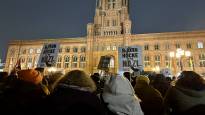“The whole of Berlin hates the Alternative for Germany party,” the rally shouted. The wave of anti-extreme right-wing demonstrations is intensifying.
BERLIN “All of Berlin hates the AfD,” echoed the slogan in front of the Rotes Rathaus of Berlin’s city hall on Wednesday evening. A harsh statement, but at least all the approximately 3,500 protesters who shouted in the cold evening were of the same opinion.
The signs read: “No room for Nazis”, “Never again” and “Fascism is not an opinion but a crime”.
The demonstration was already at least the third in less than a week in the German capital. Opponents of the country’s fascists and neo-Nazis have formed a new tight-knit network they call the Round Table. It has been holding protests in several German cities since last week. There is more to come and the wave of protests continues.
During the rest of the week, large gatherings and marches are planned, from Dresden and Leipzig in eastern Germany to Cologne, Hamburg and Düsseldorf in the west. More than 180 organizations are inviting demonstrators to the center of Munich on Sunday, and tens of thousands of people are expected.
The evacuation was planned for three groups of people
Germans have taken to the barricades in droves since last week’s revelations of a secret meeting between right-wing extremists, neo-Nazis and some business leaders in Potsdam, near Berlin, in November. Among other things, the forced relocation of people with a foreign background out of Germany was planned there.
The meeting was revealed by Correctiv, a media focused on investigative journalism, which did real agent work: its reporters rented some kind of sauna raft, from which they took pictures of the meeting in the hotel’s villa with a telephoto lens. Inside the building, someone filmed the meeting with a camera hidden in the clock, according to German media.
According to Correctiv, the participants of the meeting classified three different groups of people who should be evicted from Germany. They would be asylum seekers, residence permit holders and German citizens with a foreign background who are “weakly integrated”. Deporting the latter would be unconstitutional.
It is well known in Germany that the political legacy of the National Socialists still lives on. After the establishment of the AfD party more than ten years ago, it has become visible, because even Nazi salutes have not been frowned upon in the party.
However, until the protests of the last few days, the neo-Nazi wing of the AfD has been allowed to live quite peacefully without the general public reacting visibly to it.
Intentions are embellished with tongue twisters
Behind the AfD party but also the CDU of the Christian Democrats sat around the Potsdam table. In addition to that, at least a few wealthy business leaders were present.
The leader of AfD participated in the meeting By Alice Weidel adviser Roland Hartwig, who was immediately fired on Monday. Weidel himself defended that the party lines are not decided in secret meetings but within the party.
In the meeting, the euphemistic word “remigration” was used for evicting foreigners, which can be translated into Finnish as return migration. In practice, however, it means the forced relocation and deportation of people with a foreign background based on their ethnic background.
In social media, many conversationalists have now started to use the term remigration more generally.
The relationship with the AfD is this year’s hot potato
In Germany, parties that try to undermine the democratic order can be banned as unconstitutional. Throughout this year, there will be a lively discussion about whether the AfD should be denied permission to operate as a party or how it should be approached.
For example, the Christian Democratic CDU party in the opposition in East Germany’s Thuringia already broke a kind of taboo last year when it cooperated with the AfD in the processing of bills. It created a huge halo.
The CDU is considered to have broken the firewall that has so far prevented traditional parties from cooperating with the AfD. Within the AfD, the CDU cooperation was rejoicing, and it was called the new normal.
In the fall, elections will be held in three eastern German states, where the support of the AfD is already clearly greater than that of any other party.
